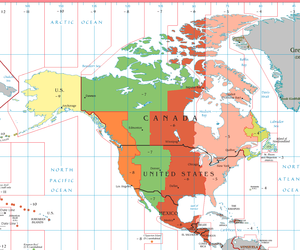North American Eastern Daylight Time
| Eastern Time Zone | |
|---|---|

Eastern Time Zone
|
|
| UTC offset | |
| EST | UTC−5:00 |
| EDT | UTC−4:00 |
| Observance of DST | |
| DST is observed in certain regions of this time zone between the 2nd Sunday in March and the 1st Sunday in November. | |
| DST began | Mar 12, 2017 |
| DST ends | Nov 5, 2017 |
The Eastern Time Zone (ET) is a time zone encompassing 17 U.S. states in the eastern part of the contiguous United States, parts of eastern Canada, the state of Quintana Roo in Mexico, Panama in Central America, and the Caribbean Islands.
Places that use Eastern Standard Time (EST) when observing standard time (autumn/winter) are 5 hours behind Coordinated Universal Time (UTC−05:00).
Eastern Daylight Time (EDT), when observing daylight saving time DST (spring/summer) is 4 hours behind Coordinated Universal Time (UTC−04:00).
In the northern parts of the time zone, on the second Sunday in March, at 2:00 a.m. EST, clocks are advanced to 3:00 a.m. EDT leaving a one-hour "gap". On the first Sunday in November, at 2:00 a.m. EDT, clocks are moved back to 1:00 a.m. EST, thus "duplicating" one hour. Southern parts of the zone (Panama and the Caribbean) do not observe daylight saving time.
The Uniform Time Act of 1966 ruled that daylight saving time would run from the last Sunday of April until the last Sunday in October in the United States. The act was amended to make the first Sunday in April the beginning of daylight saving time as of 1987. The Energy Policy Act of 2005 extended daylight saving time in the United States beginning in 2007. So local times change at 2:00 a.m. EST to 3:00 a.m. EDT on the second Sunday in March and return at 2:00 a.m. EDT to 1:00 a.m. EST on the first Sunday in November. In Canada, the time changes as it does in the United States.
In Canada, the following provinces and territories are part of the Eastern Time Zone:
The boundary between time zones is set forth in the Code of Federal Regulations, with the boundary between the Eastern and Central Time Zones being specifically detailed at 49 CFR 71.
...
Wikipedia
